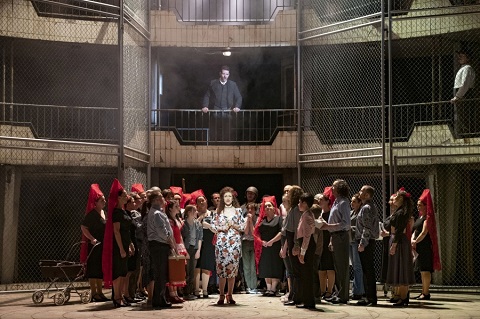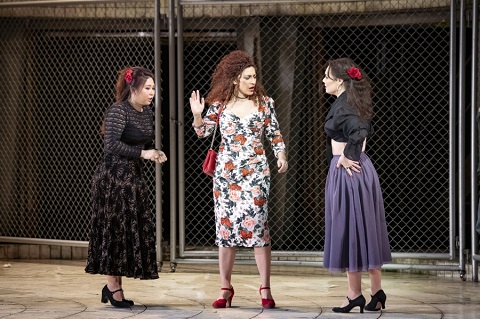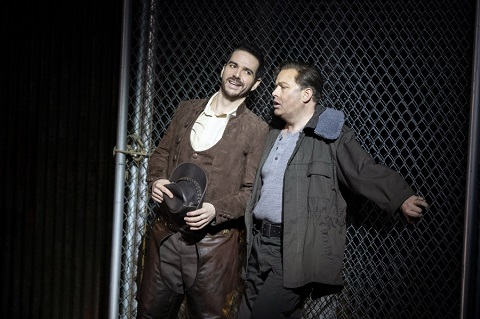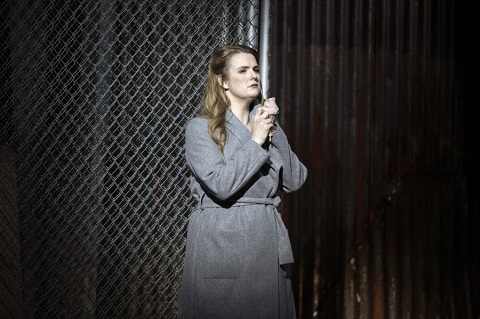Recently in Reviews
English Touring Opera are delighted to announce a season of lyric monodramas to tour nationally from October to December. The season features music for solo singer and piano by Argento, Britten, Tippett and Shostakovich with a bold and inventive approach to making opera during social distancing.
This tenth of ten Live from London concerts was in fact a recorded live performance from California. It was no less enjoyable for that, and it was also uplifting to learn that this wasn’t in fact the ‘last’ LfL event that we will be able to enjoy, courtesy of VOCES8 and their fellow vocal ensembles (more below …).
Ever since Wigmore Hall announced their superb series of autumn concerts, all streamed live and available free of charge, I’d been looking forward to this song recital by Ian Bostridge and Imogen Cooper.
The Sixteen continues its exploration of Henry Purcell’s Welcome Songs for Charles II. As with Robert King’s pioneering Purcell series begun over thirty years ago for Hyperion, Harry Christophers is recording two Welcome Songs per disc.
Although Stile Antico’s programme article for their Live from London recital introduced their selection from the many treasures of the English Renaissance in the context of the theological debates and upheavals of the Tudor and Elizabethan years, their performance was more evocative of private chamber music than of public liturgy.
In February this year, Albanian soprano Ermonela Jaho made a highly lauded debut recital at Wigmore Hall - a concert which both celebrated Opera Rara’s 50th anniversary and honoured the career of the Italian soprano Rosina Storchio (1872-1945), the star of verismo who created the title roles in Leoncavallo’s La bohème and Zazà, Mascagni’s Lodoletta and Puccini’s Madama Butterfly.
Evidently, face masks don’t stifle appreciative “Bravo!”s. And, reducing audience numbers doesn’t lower the volume of such acclamations. For, the audience at Wigmore Hall gave soprano Elizabeth Llewellyn and pianist Simon Lepper a greatly deserved warm reception and hearty response following this lunchtime recital of late-Romantic song.
Collapsology. Or, perhaps we should use the French word ‘Collapsologie’ because this is a transdisciplinary idea pretty much advocated by a series of French theorists - and apparently, mostly French theorists. It in essence focuses on the imminent collapse of modern society and all its layers - a series of escalating crises on a global scale: environmental, economic, geopolitical, governmental; the list is extensive.
For this week’s Live from London vocal recital we moved from the home of VOCES8, St Anne and St Agnes in the City of London, to Kings Place, where The Sixteen - who have been associate artists at the venue for some time - presented a programme of music and words bound together by the theme of ‘reflection’.
'Such is your divine Disposation that both you excellently understand, and royally entertaine the Exercise of Musicke.’
Amongst an avalanche of new Mahler recordings appearing at the moment (Das Lied von der Erde seems to be the most favoured, with three) this 1991 Mahler Second from the 2nd Kassel MahlerFest is one of the more interesting releases.
‘And there was war in heaven: Michael and his angels fought against the dragon; and the dragon fought and his angels, And prevailed not; neither was their place found any more in heaven … that old serpent … Satan, which deceiveth the whole world: he was cast out into the earth, and his angels were cast out with him.’
If there is one myth, it seems believed by some people today, that probably needs shattering it is that post-war recordings or performances of Wagner operas were always of exceptional quality. This 1949 Hamburg Tristan und Isolde is one of those recordings - though quite who is to blame for its many problems takes quite some unearthing.
There was never any doubt that the fifth of the twelve Met Stars Live in Concert broadcasts was going to be a palpably intense and vivid event, as well as a musically stunning and theatrically enervating experience.
‘Love’ was the theme for this Live from London performance by Apollo5. Given the complexity and diversity of that human emotion, and Apollo5’s reputation for versatility and diverse repertoire, ranging from Renaissance choral music to jazz, from contemporary classical works to popular song, it was no surprise that their programme spanned 500 years and several musical styles.
The Academy of St Martin in the Fields have titled their autumn series of eight concerts - which are taking place at 5pm and 7.30pm on two Saturdays each month at their home venue in Trafalgar Square, and being filmed for streaming the following Thursday - ‘re:connect’.
The London Symphony Orchestra opened their Autumn 2020 season with a homage to Oliver Knussen, who died at the age of 66 in July 2018. The programme traced a national musical lineage through the twentieth century, from Britten to Knussen, on to Mark-Anthony Turnage, and entwining the LSO and Rattle too.
With the Live from London digital vocal festival entering the second half of the series, the festival’s host, VOCES8, returned to their home at St Annes and St Agnes in the City of London to present a sequence of ‘Choral Dances’ - vocal music inspired by dance, embracing diverse genres from the Renaissance madrigal to swing jazz.
Just a few unison string wriggles from the opening of Mozart’s overture to Le nozze di Figaro are enough to make any opera-lover perch on the edge of their seat, in excited anticipation of the drama in music to come, so there could be no other curtain-raiser for this Gala Concert at the Royal Opera House, the latest instalment from ‘their House’ to ‘our houses’.
"Before the ending of the day, creator of all things, we pray that, with your accustomed mercy, you may watch over us."
Reviews

03 Mar 2020
WNO revival of Carmen in Cardiff
Unveiled by Welsh National Opera last autumn, this Carmen is now in its first revival. Original director Jo Davies has abandoned picture postcard Spain and sun-drenched vistas for images of grey, urban squalor somewhere in modern-day Latin America.
Of course, Bizet’s brightly lit score has all the atmosphere, vibrant
colours and exotica of the Spain he never visited, and the strength of its
text means it can survive even the most bizarre transpositions. This
production certainly brings a new approach and rather than just project
Carmen as a sexual predator, she’s cast as a working-class girl, one whose
poverty brings her close to an underclass of uneducated, virtually lawless
drug pedlars and gunrunners.
It’s this sense of deprivation and unruliness that influences both Davies
and designer Leslie Travers whose set comprises a three-tiered curve of
slummy apartments facing an unfinished courtyard with surrounding steel
fencing. Grim as it is, the whole bears kinship with a favela, cleverly
conveying a barracks (with family accommodation - even a brothel),
cigarette factory or more probably a drug-smuggling plant, Lillas Pastia’s
mountain tavern and a suggestion of a bullring. Much of the success of this
is achieved through Gabriel Dalton’s costumes and Oliver Fenwick’s subtle
lighting.
 Haegee Lee (Frasquita), Julia Mintzer (Carmen) and Angela Simkin (Mercédès). Photo credit: Richard Hubert Smith.
Haegee Lee (Frasquita), Julia Mintzer (Carmen) and Angela Simkin (Mercédès). Photo credit: Richard Hubert Smith.
So far so good in its transposition from 19th-century Seville to
a contemporary, non-specific location in Brazil. And so far, so good too,
in its limited way, to focus on Carmen as a product of her environment. But
Bizet’s masterpiece not only illuminates those at the bottom of the heap
and the tensions between free will and restriction (consider all the steel
fences), but charts the destructive power of obsession, the psychological
plunge of Don José from decent lad to addictive, jealous and
ultimately rejected lover.
Directorial novelty for one of the most performed operas in the repertoire
is welcome, in fact it’s virtually a necessity. But so is a mezzo who can
offer an essential mix of physical allure and danger. Despite striking
looks and a vivid stage presence, Julia Mintzer never quite raised the
emotional temperature; her devil-may-care wantonness was lukewarm and her
somewhat plummy ‘Habanera’ made little impact. She possesses an attractive
voice, but gypsy grit and growl is largely absent, and when the temptress
in her finally emerges in the ‘Seguidilla’ her vocal projection is limited.
It was not until we reached Act Two’s tavern duet, ‘Je vais danser’, that a
light and flexible voice charmed the ear.
 Giorgio Caoduro (Escamillo) and Peter Auty (Don José). Photo credit: Richard Hubert Smith.
Giorgio Caoduro (Escamillo) and Peter Auty (Don José). Photo credit: Richard Hubert Smith.
A well-cast Giorgio Caoduro as Escamillo brought smouldering looks and
plenty of swagger. His rich, gnarly baritone - pushing a little too hard in
the second act showpiece - found more even tone in his confrontational duet
with Don José, sung with impressive ease by the lyric tenor Peter Auty. His
was a portrayal of gathering intensity, delivering an impassioned ‘Flower
Song’, and by Act Four his implicit doom was a mixture of rage and
hopelessness. Chemistry between Auty and Elin Pritchard as the jilted
Micaëla made clear shortcomings elsewhere. Her wide-eyed innocence was
matched by a voice of homespun simplicity; operatic heft traded for sweetly
calibrated lyricism.
 Elin Pritchard (Micaëla). Photo credit: Richard Hubert Smith.
Elin Pritchard (Micaëla). Photo credit: Richard Hubert Smith.
Prominent among the remaining cast are the bright, complementary voices of
Hagen Lee and Angela Simkin as Frasquita and Mercédès faring well in the
fortune-telling sequence, while John Savournin and Ross Ramgobin make their
mark early on as Zuniga and Moralès. There’s robust singing from the Chorus
and notably from some superbly trained school children whose jewel-like
voices and conspicuous enthusiasm leaves a vivid impression. In the pit
Harry Ogg drove through the score with a zeal that generated some
startlingly fast tempos - a steeple chase of an overture and a rushed Act 3
prelude will hopefully gain some poise in time - but the orchestra
responded with suitably clean, zesty playing. If you don’t mind the
distracting dance episodes and the sludgy colours, this Carmen is worth
seeing and in time its personal dramas will burn more fiercely.
David Truslove
Carmen - Julia Mintzer, Don José - Peter Auty, Escamillo - Giorgio
Caoduro, Micaëla - Elin Pritchard, Zuniga - John Savournin, Moralès - Ross
Ramgobin, Frasquita - Hagen Lee, Mercédès - Angela Simkin, Dancaïro -
Howard Kirk, Remendado - Joe Roche, Director - Jo Davies, Conductor - Harry
Ogg, Revival director - Oliver Lamford, Set designer - Leslie Travers,
Costume designer - Gabrielle Dalton, Lighting designer - Oliver Fenwick,
Movement director - Denni Sayers.
Welsh National Opera, Wales Millennium Centre, Cardiff; Thursday 27th February 2020.



